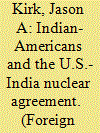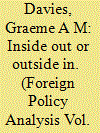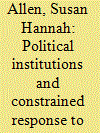| Srl | Item |
| 1 |
ID:
082631


|
|
|
|
|
| Publication |
2008.
|
| Summary/Abstract |
If Rwanda had been better understood at the outset of the 1994 genocide, would the world have responded differently? That the international community was afflicted with a "Somalia Syndrome," suppressing the appetite for intervention in Rwanda, is not a new claim. What is new, however, is the effort this article makes to unravel the reasons for which two largely unrelated and distinct conflicts-Somalia and Rwanda-were perceived within many critical policy-making quarters around the international community as identical "African" conflict-types. It raises and explores the possibility that had Rwanda been perceived outside of this contorting "African" schema and its associated Somalia analogy, different policy responses could have been legitimized, opening the potential for a radically different international response.
|
|
|
|
|
|
|
|
|
|
|
|
|
|
|
|
| 2 |
ID:
082630


|
|
|
|
|
| Publication |
2008.
|
| Summary/Abstract |
The transformation of U.S.-India relations has been, arguably, one of the most significant developments in American foreign policy in the past decade. Both countries' leaderships regard a recent nuclear cooperation agreement as the most important step yet in their emerging "strategic partnership." But the deal is also deeply controversial-critics see it as a major departure from decades-standing nonproliferation norms-and its approval by the U.S. Congress in 2006 was far from assured. This paper argues that an increasingly professional and well-funded "India lobby" among Indian-Americans was critical in pressing members of Congress to support the nuclear agreement. Moreover, this episode may portend its emergence as one of the most important ethnic communities seeking influence over U.S. foreign policy in the 21st century-if it can sustain momentum for its ambitious long-term goals, such as securing a permanent seat for India on the UN Security Council, through the uncertain near-term future of the nuclear agreement itself.
|
|
|
|
|
|
|
|
|
|
|
|
|
|
|
|
| 3 |
ID:
082627


|
|
|
| 4 |
ID:
082629


|
|
|
|
|
| Publication |
2008.
|
| Summary/Abstract |
Institutional constraints within the target state not only influence a leader's ability to resist economic sanctions, but they also affect the decision-making process within the target state and the nature of information that a sender can ascertain about likely response. Autocratic leaders, who are less constrained, send noisier signals about their probable behavior. This lack of constraint also allows more freedom to resist sanctions, as they can shunt the costs of sanctions off onto the general public, who have little influence over policy outcomes or leadership retention. Democratic leaders are more constrained and more susceptible to sanctions pressure. As result, there is less uncertainty for senders about probable response. Using a heteroskedastic probit model to explore potential systematic components of the variation surrounding sanctions response, the impact of sanctions is shown to differ by regime type-both in the response to coercion as well as in the variance surrounding that response. The results presented here suggest that as expected, democracies are more susceptible to sanctions pressure, but the response of mixed and authoritarian systems are more difficult to predict. These findings have implications for the design of future sanctions policy as well as suggesting which states make the best targets for economic coercion
|
|
|
|
|
|
|
|
|
|
|
|
|
|
|
|
| 5 |
ID:
082628


|
|
|
|
|
| Publication |
2008.
|
| Summary/Abstract |
.S. governors lead overseas missions seeking investment and promoting trade, establish international offices, meet with heads of government, receive ambassadors, and take positions on foreign policy. This paper describes how governors are involved in participating in U.S. foreign policy, explains why governors seek to voice their views and play an active role in working with leaders and issues beyond their state's borders, and argues that U.S. states and governors need to be better conceptualized and considered in both international relations theory and foreign policy analysis. This study reveals that governors with greater institutional powers-such as appointment and budgetary control-as well as personal powers-derived from their electoral mandate, ambition, and public approval-are more likely to have higher degrees of foreign policy activity. These actions are more likely to take place during wartime and also from governors representing U.S. states bordering Canada or Mexico
|
|
|
|
|
|
|
|
|
|
|
|
|
|
|
|